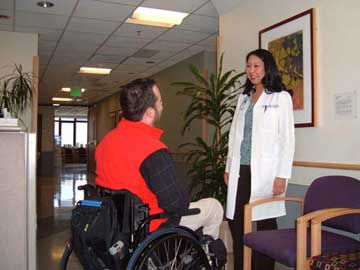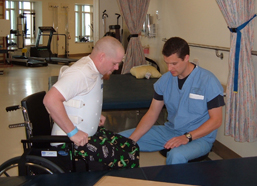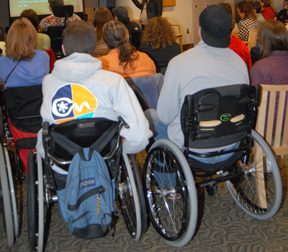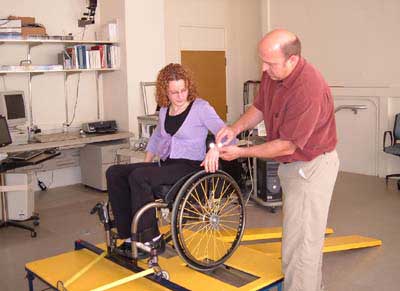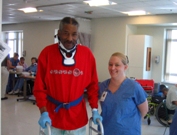Spring 2003
Alcohol and Your Health After SCI
Resources on this topic are listed at the end of this report
Although most of us know that overuse of alcohol can have severe health consequences, people with SCI may not be aware of the unique health problems associated with alcohol use-even in small amounts-after SCI.
People drink for many reasons, perhaps most commonly because alcohol in low doses produces pleasant relaxing effects and reduces inhibition. These positive effects are reversed, however, after more than 2 to 3 drinks. And although people may think they need alcohol to be relaxed and sociable, researchers have found that given the right social situation, such as a party, people experience the same enjoyable effects even if their drinks contain nothing more than the taste of alcohol.
According to the Surgeon General, "normal" drinking is not more than one drink per day for women or two drinks per day for men. (One drink equals about 12 ounces of beer, five ounces of wine or one ounce of hard liquor.) Normal drinking can be a healthy choice for some people: it seems to reduce the risk for coronary heart disease (including heart attack) and stroke by about 20-40% in the non-spinal-injured population.
Drinking more than the Surgeon General recommends increases the risk for stroke and for developing cancer of the liver, mouth, throat, larynx and esophagus. Heavy drinking can damage the liver and pancreas. Alcohol irritates the lining of the esophagus and stomach, increasing the risk for inflammation, tearing (ulceration) and bleeding of the stomach lining. Over time, heavy drinking can damage the brain and impair memory and thinking. "Binge" drinking-defined as more than four drinks at a time- dramatically increases the risk of falls, car crashes and other injuries. Many people believe that because they no longer feel drunk after more than 3 to 4 drinks, alcohol is not harming them. This is not true: even when the awareness of drinking too much becomes dim, the damage to organ systems continues unabated.
In addition to these general alcohol-related risks, people with SCI need to be aware of several unique concerns. To begin with, weight loss after SCI may cause people to become more intoxicated if they drink the same amount as they did before injury. Alcohol lowers the body's ability to fight infections. Even one drink temporarily lowers immune function; regular drinking lowers immune function more and the lowered immunity can last up to two months after drinking stops. Compromised immune function can reduce your body's ability to fight urinary tract, bladder and skin infections.
Alcohol causes the body to produce more urine and fill the bladder more quickly. While drinking, people sometimes become careless with bladder care and wait too long to empty the bladder, which can overstretch the bladder wall and weaken the muscle lining. Overstretching the bladder causes backflow of urine into the kidneys, kidney infection and progressive damage over time. Alcohol also causes dehydration, increasing the risk for developing pressure sores. Overfilling the bladder can also cause autonomic dysreflexia, a dangerous increase in blood pressure that can lead to stroke, convulsions or even death.
Alcohol can interact dangerously with other medications, especially those used for pain, spasticity and infection. Using alcohol along with pain relievers such as aspirin or ibuprofen can cause stomach and intestinal bleeding. Repeated use of alcohol at the same time as acetaminophen can cause liver damage. If used with narcotic pain medications (Oxycodone, Oxycontin), antidepressants (fluoxetine, paroxitine, citalopram, sertraline, nortriptyline, trazodone) or anti-spasticity medications such as diazepam (Valium), alcohol can cause confusion, greater drowsiness and motor incoordination. Alcohol can also change or reduce the effectiveness of other medications and cause them to build up in your bloodstream. Drinking while taking blood thinners (warfarin/Coumadin) can cause excessive bleeding or blood clots. Drinking while on antibiotics can cause facial flushing, nausea and vomiting.
Alcohol reduces male sex hormone (testosterone) production in males, inhibiting sexual performance (erection and ejaculation). Alcohol reduces sexual desire and sexual satisfaction in both men and women. Abstinence from alcohol improves sexual function in men and women.
Even though alcohol may help people fall asleep, it causes them to sleep fitfully or awaken easily later in the sleep cycle. Alcohol consumed even six hours before bedtime can disrupt sleep in the middle of the night.
People who drink or have a history of alcohol-related difficulties often develop skin problems because they forget to do weight shifting and pressure releases. In some people alcohol can cause bladder or bowel incontinence, which also irritates the skin. Impaired judgment or coordination from alcohol use can lead to accidents, falls or burns.
Although people who sustain SCI often have a prior history of heavy drinking and/or alcohol-related life problems, many of them stop or reduce their drinking after injury, according to a study conducted at Harborview Medical Center. For many, spinal injury appears to be a wake-up call regarding unhealthy lifestyles and habits. On the other hand, about 30% of those with a history of problem drinking are still drinking heavily and experiencing significant alcohol-related life problems one year after SCI.
If you sometimes wonder whether you are drinking in a healthy way, you can take a confidential "drinker's checkup" at your doctor's office or online at www.alcoholscreening.org . The Web site compares your drinking pattern, genetic history, and the effects of drinking on your life to what is average or normal for Americans.
There are many different strategies for changing drinking behavior, including developing a plan with your health provider, enlisting the help of family or friends, or using support groups such as Alcoholics Anonymous, Rational Recovery, or Moderation Management. Thinking about your life goals can help motivate you to develop strategies that fit your situation. Change can be an extended process and often involves relapses, but each time you try again you improve your chances of success.
Charles H. Bombardier, PhD
Resources
- Alcoholics Anonymous (Offices and meetings all over the world; check the business pages of your phone book.)
- Moderation Management , 22 W 27th Street, New York, NY 10001; 212-871-0974.
- Rational Recovery , Box 800, Lotus, CA 95651; 530-621-2667.
- AlcoholScreening.org is an online resource that includes an alcohol screening self-test, information and resources.
- Substance Abuse and Mental Health Services Administration (SAMHSA) Treatment Facility Finder is a searchable directory of alcohol and drug treatment facilities throughout the country.

